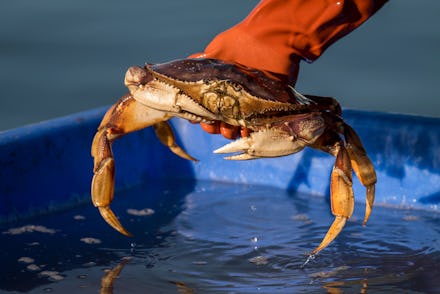The Pacific Ocean is becoming so acidic that crabs' shells are dissolving

When an ecosystem changes, its inhabitants change, too. Which is exactly what's happening in the Pacific Ocean, where in some parts the water is acidifying at a rate greater than the rest of the world. A recent study, funded by the National Oceanic and Atmospheric Administration (NOAA), has found that the acidification of the Pacific Ocean is dissolving the shells of Dungeness crab larvae in the Pacific Northwest. The authors of the study described ocean conditions that prevented the baby crabs from building strong shells that could protect them from predators and help them float in the water. The acidified seawater also damaged the crabs' tiny, hair-like receptors, which hurt their ability to hunt and navigate their surroundings.
These are findings the scientists didn't expect to see until "much later in this century," study co-author Richard Feely told CNN. If conditions continue to impact the baby Dungeness like this, the species could struggle to survive in the future. The thinning crab shells also indicate that other shelled creatures, like clams, could be having similar problems as well. This is worrying news for the local ecosystem and the humans that rely on these creatures for food or jobs.
"If the crabs are affected already, we really need to make sure we pay much more attention to various components of the food chain before it is too late," added lead author Nina Bednarsek.
If acidification continues in the Pacific Ocean, wrote the authors, the larval crabs' shells could become deformed, complicating crab molting and increasing the chances of death during molting. Although the study did not cover fully grown, adult crabs, the threat to the survivability of the young crustaceans can be just as concerning.
According to the NOAA, ocean acidification is caused by the increase of CO2 in the atmosphere. As the ocean naturally absorbs more carbon from the air, it changes the pH balance of the waters. The altered pH levels make it difficult for shelled sea creatures to get the ions they need to develop strong, hard shells. Eventually, continued acidification conditions can impact fish as well. Other studies have found that fish have trouble detecting predators in acidic waters and can struggle with using their senses correctly.
With this study, the NOAA appears to be striving to provide more evidence for regulations that will reduce our carbon footprints and prepare coastal communities for a possible hit to their way of life. Unless immediate action is taken, the organization predicts there will be at least two billion people affected by the changes to come.